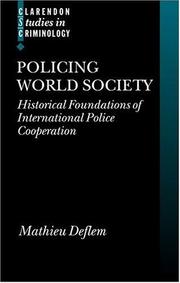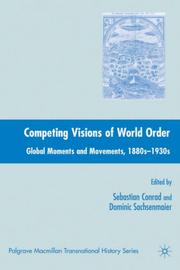| Listing 1 - 6 of 6 |
Sort by
|

ISBN: 0199259623 9780199259625 Year: 2002 Publisher: Oxford [etc.] : Oxford University Press,
Abstract | Keywords | Export | Availability | Bookmark
 Loading...
Loading...Choose an application
- Reference Manager
- EndNote
- RefWorks (Direct export to RefWorks)
Police --- International cooperation --- History --- -Police --- -Cops --- Gendarmes --- Law enforcement officers --- Officers, Law enforcement --- Officers, Police --- Police forces --- Police officers --- Police service --- Policemen --- Policing --- Criminal justice, Administration of --- Criminal justice personnel --- Peace officers --- Public safety --- Security systems --- -History --- -International cooperation --- -Legal status, laws, etc. --- Cops --- Legal status, laws, etc. --- Police - International cooperation - History - 19th century --- Police - International cooperation - History - 20th century --- Cooperation policiere internationale --- Interpol
Book
ISBN: 9522228095 9522228087 9517469047 9789522228093 9789522228086 9789517469043 Year: 2016 Publisher: Helsinki : Finnish Literature Society / SKS,
Abstract | Keywords | Export | Availability | Bookmark
 Loading...
Loading...Choose an application
- Reference Manager
- EndNote
- RefWorks (Direct export to RefWorks)
"In the early 19th century, the only way to transmit information was to send letters across the oceans by sailing ships or across land by horse and coach. Growing world trade created a need and technological development introduced options to improve general information transmission. Starting in the 1830s, a network of steamships, railways, canals and telegraphs was gradually built to connect different parts of the world. The book explains how the rate of information circulation increased many times over as mail systems were developed. Nevertheless, regional differences were huge. While improvements on the most significant trade routes between Europe, the Americas and East India were considered crucial, distant places such as California or Australia had to wait for gold fever to become important enough for regular communications. The growth of passenger services, especially for emigrants, was a major factor increasing the number of mail sailings. The study covers the period from the Napoleonic wars to the foundation of the Universal Postal Union (UPU) and includes the development of overseas business information transmission from the days of sailing ships to steamers and the telegraph."
International trade --- Postal service --- History --- International cooperation --- Postage service --- External trade --- Foreign commerce --- Foreign trade --- Global commerce --- Global trade --- Trade, International --- World trade --- Commerce --- International economic relations --- Non-traded goods --- Mail --- Mail service --- Post-office --- Carriers --- Communication and traffic --- Transportation --- International trade - History - 19th century --- Postal service - International cooperation - History - 19th century

ISBN: 140397988X 9781403979889 Year: 2007 Publisher: Basingstoke Palgrave Macmillan
Abstract | Keywords | Export | Availability | Bookmark
 Loading...
Loading...Choose an application
- Reference Manager
- EndNote
- RefWorks (Direct export to RefWorks)
World politics --- International cooperation --- Ordre mondial --- --État --- --Politique mondiale --- --1830-1940, --- History --- Cooperation, International --- Global governance --- Institutions, International --- Interdependence of nations --- International institutions --- World order --- Cooperation --- International relations --- International organization --- World politics - 19th century --- World politics - 1900-1945 --- International cooperation - History - 19th century --- International cooperation - History - 20th century --- État --- Politique mondiale
Book
ISBN: 9780226060118 9780226060088 9780226060255 022606008X 022606011X 022606025X 9781299784642 129978464X Year: 2013 Publisher: Chicago, Ill. University of Chicago Press
Abstract | Keywords | Export | Availability | Bookmark
 Loading...
Loading...Choose an application
- Reference Manager
- EndNote
- RefWorks (Direct export to RefWorks)
How states cooperate in the absence of a sovereign power is a perennial question in international relations. With Power in Concert, Jennifer Mitzen argues that global governance is more than just the cooperation of states under anarchy: it is the formation and maintenance of collective intentions, or joint commitments among states to address problems together. The key mechanism through which these intentions are sustained is face-to-face diplomacy, which keeps states' obligations to one another salient and helps them solve problems on a day-to-day basis. Mitzen argues that the origins of this practice lie in the Concert of Europe, an informal agreement among five European states in the wake of the Napoleonic wars to reduce the possibility of recurrence, which first institutionalized the practice of jointly managing the balance of power. Through the Concert's many successes, she shows that the words and actions of state leaders in public forums contributed to collective self-restraint and a commitment to problem solving-and at a time when communication was considerably more difficult than it is today. Despite the Concert's eventual breakdown, the practice it introduced-of face to face diplomacy as a mode of joint problem solving-survived and is the basis of global governance today.
International relations. Foreign policy --- International cooperation --- International relations --- World politics --- Public relations and politics --- Concert of Europe --- History --- Concert of Europe. --- #SBIB:93H3 --- #SBIB:327.1H10 --- European concert --- Great powers --- International organization --- Politics, Practical --- Politics and public relations --- Public relations --- Coexistence --- Foreign affairs --- Foreign policy --- Foreign relations --- Global governance --- Interdependence of nations --- International affairs --- Peaceful coexistence --- World order --- National security --- Sovereignty --- Cooperation, International --- Institutions, International --- International institutions --- Cooperation --- Thematische geschiedenis --- Internationale betrekkingen: theorieën --- Political aspects --- International cooperation - History - 19th century --- International relations - History - 19th century --- World politics - 19th century --- Public relations and politics - History - 19th century
Book
ISBN: 2873863994 Year: 2005 Publisher: Bruxelles Racine
Abstract | Keywords | Export | Availability | Bookmark
 Loading...
Loading...Choose an application
- Reference Manager
- EndNote
- RefWorks (Direct export to RefWorks)
Fruit d'une étude originale menée à partir d'archives inédites, l'ouvrage présente une histoire interne du Conseil international des femmes, surtout depuis la fin de la Seconde Guerre mondiale. Ce Conseil occupe en effet une place remarquable au sein du féminisme international : depuis 1888, il s'est imposé sur la scène occidentale puis mondiale, il a réussi à s'y maintenir et à s'adapter à tous les bouleversements entraînés par deux guerres mondiales et par la décolonisation. Auprès de la Société des Nations d'abord, de l'ONU ensuite, il a collaboré à de nombreuses conventions dont le point d'orgue est, en 1979, la Convention sur l'élimination de toutes les discriminations à l'égard des femmes (CEDAW). Par sa large fresque des activités du CIF, l'ouvrage aborde en réalité l'essentiel des grandes questions sur les femmes au cours d'un demi-siècle ; mais il pose aussi, avec beaucoup de lucidité, la question des difficultés nées de la multiplication des tensions et des conflits dans le monde, du multiculturalisme, de la concurrence des ONG de plus en plus nombreuses
Feminism - International cooperation - History - 19th century --- Feminism - International cooperation - History - 20th century --- Féminisme --- Coopération internationale --- XIXe-XXe s., 1801-2000 --- Sociology of the family. Sociology of sexuality --- Internationale Vrouwenraad --- International Council of Women --- anno 1800-1999 --- Feminism --- Nations Unies. Comité pour l'élimination de la discrimination à l'égard des femmes --- Conseil international des femmes --- Femmes --- International cooperation --- History --- 19e siècle --- 20e siècle --- Droits --- History. --- International --- Women's movements --- Women's organizations --- Book --- Women --- Féminisme --- Legal status, laws, etc. --- Droit --- Nations Unies. Comité pour l'élimination de la discrimination à l'égard des femmes --- 19e siècle --- 20e siècle

ISBN: 0521403863 9780521524742 9780511599699 9780521403863 0521524741 0511599692 Year: 1992 Publisher: Cambridge Cambridge University Press
Abstract | Keywords | Export | Availability | Bookmark
 Loading...
Loading...Choose an application
- Reference Manager
- EndNote
- RefWorks (Direct export to RefWorks)
The founding of the Nobel Prize in 1901 confirmed the internationalisation of science. The workings of the Nobel institution rested on an international community of scientists who forwarded candidates for the prizes. Along with the candidates and eventual prizewinners, they constituted the Nobel population, which in the fields of chemistry and physics between 1901 and 1939 numbered over one thousand scientist renown from twenty-five countries. Crawford uses this Nobel population for prosopographic studies that shed new light on national and international science between 1901 and 1939. Her four studies examine the following problems: the upsurge of nationalism among scientists of warring nations during and after World War I; the existence of a scientific centre and periphery in Central Europe; the élite conception of science in the United States; and the effective use of the Nobel prizes in an organisation whose primary purpose was to further national science.
Sociology of knowledge --- Pure sciences. Natural sciences (general) --- anno 1800-1999 --- Competition, International --- -Nobel Prizes --- -Science --- -Scientists --- -Professions --- Natural science --- Science of science --- Sciences --- Awards --- International competition --- World economics --- International relations --- International trade --- War --- Historiography --- International cooperation --- -History --- -International cooperation --- -Historiography --- Economic aspects --- Nobel Prizes --- Science --- Scientists --- Professional employees --- History --- 19th century --- 20th century --- Nobel prizes --- United States --- Europe --- Competition [International ] --- Science - Historiography. --- Science - International cooperation - History - 19th century. --- Science - International cooperation - History - 20th century. --- Nobel prizes - Historiography. --- Scientists - United States - Historiography. --- Scientists - Europe - Historiography. --- Competition, International - Historiography. --- Historiography. --- International cooperation. --- Natural sciences --- Arts and Humanities
| Listing 1 - 6 of 6 |
Sort by
|

 Search
Search Feedback
Feedback About UniCat
About UniCat  Help
Help News
News